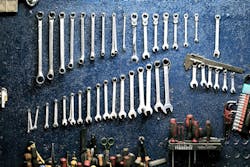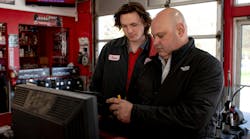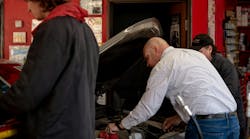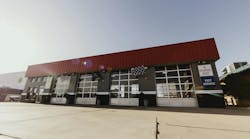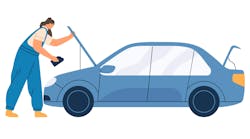Throughout life, you will have a multitude of relationships. Some of those relationships will end up with you and the other person benefitting from it. Some will end with the other person benefitting and you being hurt. It’s just the way it goes. I learned part of this lesson from my science class back in high school when the subject of symbiosis was brought up for discussion.
There are different types of symbiotic relationships. The one where only the other person benefits and you’re left harmed is called parasitism. The relationship where you and someone else both benefit is called mutualism.
Mutualism is the best of both worlds. For example, the bullhorn acacia tree provides food and shelter for certain species of ants. The ants, in return, become very territorial and ward off any other predators that could harm the tree, such as attacking grasshoppers and caterpillars. If a tree growing next to the ants’ home so much as has a limb touching the bullhorn acacia, the ants will kill the entire branch. Now, that’s the kind of relationship everyone should have.
As an operator in the quick lube industry, you have a mutualistic relationship with your customers. Your customers benefit from the excellent care you provide their vehicles and you benefit because their patronage sustains your business. However, there’s another relationship your quick lube mutually benefits from — your distributor.
Distributors and warehouses carry a multitude of products that help keep your quick lube running efficiently.
“We consider ourselves a one-stop shop,” said Andrew Haag, president of Moore Oil in Milwaukee, Wisconsin. “We carry a lot of different products — from core lubricant products to ancillary items such as oil filters, air filters, cabin air filters, wiper blades and detail products — so we can try to meet the needs of the installer with a single-point connection to a lot of different products they would need to run their facilities.”
Your distributor does more than provide the oil that flows through your shop. They can help you make better buying decisions and guide you on what other services you could possibly add to your menu.
“We talk [to our customers] about what services and elements they can add to keep their average ticket price growing or stabilized,” Haag said.
If you contact your distributor, they should be able to offer you a popularity guide that breaks down the most popular makes and models in the U.S. so you know which vehicles you’ll most likely see drive in to your bays.
“We have the ability to produce demographics for our customers and tell them the top 25-selling vehicles in the U.S.,” Haag said.
Other distributors may have guides that are broken down further by state or even your zip code, so ask them if that’s something they can provide to you.
If you need help creating a marketing plan or deciding on how to price the products in your shop, then your distributor can help you with that, too.
“We have the service side of our business where we create marketing plans and discuss pricing,” Haag said. “We give our customers market insight as far as what’s going on with the market and what other installers in their area are doing. We don’t give away trade secrets, but we do a lot of business with installers in other markets.”
OEMs are flooding the market with new products. It can be difficult to not only keep track of what your store should or shouldn’t carry, but also difficult to receive proper training on these products. But, your distributor is there to help.
“We help with training our customers on products,” Haag said. “We’re a Mobil-branded distributor, and Mobil has a Performance Training Academy for installers, which is offered online. We also have representatives from our store, as well as Mobil representatives, who will go to stores either quarterly or once or twice a year to do live training with our installers and their staff. The point of the training is to give them product knowledge, but it’s also training them on how to present products to their customers so they feel empowered to make a decision that’s right for them.”
Your technicians may not feel comfortable selling additional items to your customers, but training from your distributor can help.
“We work with [the installers and their techs] and train them on how to walk through a sales sheet — or an offering sheet — with products that fall into the ‘good, better, best’ column and what makes the most sense for their customer’s car or what the car manufacturer requires for it,” Haag said. “We also offer training on some of the ancillary items. It might be fluid maintenance exchange products or the flush products — a transmission or coolant flush. There’s a lot of training on what the product is, what it does and doesn’t do and what the intervals are. We walk through a lot of different areas and help them speak to their customers so the customer is empowered to make the right decision for their vehicle.”
Some distributors have incentives. For example, the oil company they’re partnered with might be able to provide you with new signage, i.e. Pennzoil, Mobil, etc. Keep in mind, that’s coming from the oil company. Some interesting incentives come directly from your distributor themselves.
“If we do a training on a specific product, we’ll have a contest or prize for that installer group by store,” Haag said. “If they reach certain goals that have been previously set forth, they’ll get a cash prize or have a pizza party, whatever the owner accepts.”
Since the recession hit the U.S. back in 2008, the auto care industry has adjusted. Your distributor is able to recognize the changing needs of your operation.
“Since the downturn in 2008, we’ve seen inventory management as a major issue,” Haag said. “At the same time, car manufacturers have introduced more products into the marketplace. There might be a 0W-20 increasing in volumes with the new Hondas and Toyotas. Installers now have to carry more products to service the customers coming to their doors. It’s an interesting balance on how they’re managing their inventory.”
You and your distributor are an important symbiotic relationship in the automotive industry. If you’re interested in learning what your distributor can do for you, call them. If you’re a distributor, reach out to your installers to let them know you’re there for them. After all, that’s how a mutualistic relationship works.
